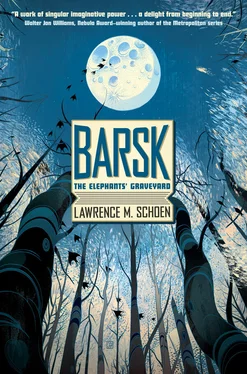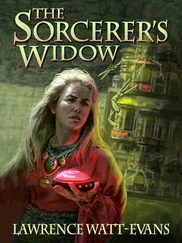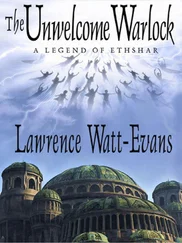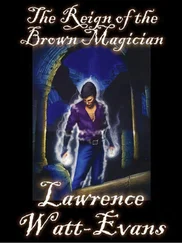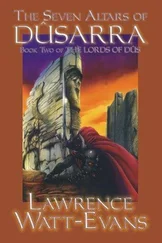SIXTEEN. UNEXAMINED CORNERS
PIZLOhad always moved about freely, whether along the boardways used by other Fant in the Civilized Wood, or more commonly crashing his way through the surrounding foliage. He clambered branch to branch and tree to tree, swung by vines, or simply dropped from one perch to another. Arlo and Tolta had ignored custom and morality by acknowledging him as their true child, but that hadn’t been enough to make him a part of the mainstream. He lived wild and free, sleeping when he felt the need in shelters he built for himself, or more rarely in the room Tolta maintained for him. He ate when he remembered to, grazing on the fruit, nuts, seeds, and leaves growing plentifully throughout the forest, or stocking up on cooked victuals when taking lessons from Jorl or visiting Tolta. In his six years, he had explored every bit of space on the island of Keslo, from the highest point of the canopy to the wet darkness of the Shadow Dwell. Keslo was his home, but much as Jorl had, Pizlo knew he had to leave. He didn’t need to go out, not into space and beyond like his mentor, but he would be going up. And he couldn’t do that from Keslo.
The question of how to travel to a neighboring island had never come up before. In his own way, and all unknowing, he’d been bound by the same cultural restrictions that kept the Fant of his home from interacting with him. The Mistakes of Nature almost never lasted through infancy. Those few that had, did not survive to adulthood, and so the need to wander from home had never occurred among his kind. Abominations always belonged to their neighborhoods, abandoned in the public meeting space soon after birth and reared grudgingly and at arm’s length by committee, without any warmth or love. It was no more possible for one to board a boat or raft and cross the water to visit another island than it was for a Fant to fly. And yet, every child of Barsk had heard the story of Pholo, however apocryphal it might be. Whether real or simply metaphorical, a Fant had flown. Pizlo couldn’t fly, but Pholo’s story offered precedent enough for him to defy both custom and propriety. He set out for Zlorka, two islands’ distance north of Keslo.
The main university in the western archipelago had been built on Zlorka, and to hear Jorl speak of it, it was the most cosmopolitan spot on the planet. Its northern edge touched the equator, and a harbor there housed the anchoring end of the planet’s sole space elevator.
Pizlo’s mesh bags made it difficult to travel by a direct route, so he walked and ran by turns along the vast maze of boardways that snaked through the Civilized Wood until he reached a balcony on its northern most point. From there he hugged his bags tightly to his body and hurtled into trees. With the ease of endless practice he began to climb down and drop. Even so, he descended much more slowly than his normal pell-mell method, exercising more care so his supplies didn’t snag on anything along the way. The extra time allowed him the luxury of grabbing handfuls of tasty leaves and nuts as he traveled, stuffing his mouth and filling his daypouch for later. By late afternoon he stood upon a narrow beach, little more than a strip of sand and gravel that marked the space between the ocean and the beginning of the forest. A light rain fell, but the wind whipped nearly sidewise. He felt the impacts like a myriad of tiny stones striking him without pause, but as ever Pizlo took no pain from any of it.
He sat on the sand and unpacked all of his “purchases,” setting aside the emergency item — a self-inflating survival boat — and redistributing the rest into his bags and daypouch. He spent a while working out how to activate his prize, but soon enough he had it open and with a twist of a knob it expanded into a shallow disk of bright yellow fabric. Pizlo piled his bags into the craft and dragged it the few steps to the water’s edge. The tide lapped at his feet, beckoning, but he paused and did not enter the boat.
“I’m going now,” he said, turning back to the forest, but actually addressing the entire island. Pizlo cocked his head, waiting for something that never arrived, and then shrugged. He glanced up at the clouded sky, shielding his sensitive eyes from the rain, and repeated, “I’m leaving, Keslo. This is new. It feels bad, but I’m doing it anyway. Just so you know.”
He stepped into the surf, wading away from shore and pulling his boat after him. When he was in up to his waist he spun around and rolled over its side, landing on his back in the bottom. He let the tide carry him out while he got himself settled with his daypouch in his lap and a long-handled paddle gripped in both hands. Dipping the paddle into the water and his trunk into his daypouch where he’d stored the nuts from his shopping, he set out from his home island for the first time, a unique event in the entire history of Barsk.
“I bet this would count toward an aleph,” he said, munching on some nuts as he paddled away.
The meager afternoon light gave way to full dusk. The wind died down and the rain went from unfelt stinging to unnoticed patter. Dusk eased into gentle darkness. Pizlo kept paddling. At other times of day there would be dozens of rafts and boats in the water between Keslo and Telba, the next island to the north and a bit west, but the trip required a short span and rarely did anyone feel the need to complicate it by making landfall at night. Pizlo had the water to himself, sparing any other Fant the confusion and horror of encountering him in such an unimaginable place. He was well past Telba by midnight, keeping his course unerringly, as if the ocean’s swells themselves passed word to him.
The rain increased again though the wind did not. Fat drops fell straight down and Pizlo had to divide his time between paddling and bailing as the tiny craft rode low with rainwater. He didn’t have a map in his head so much as a precise sense of where he was, where he’d been, and where he wanted to be. At a point roughly halfway between Telba and Zlorka the rain eased off and he could concentrate exclusively on paddling again.
His palms and fingers had long since blistered, and the blisters broken open. Pizlo only noticed that the paddle slipped in his grip a bit more than before and attributed it to the rain.
Well before dawn, Pizlo paused. He felt something. He had no sensation of pain from his bleeding hands nor any awareness of the strained muscles that had spread across his back. The cramps in his legs from sitting too long in place made him awkward but otherwise caused no discomfort. Rather, an insight had come upon him, like the moment when he’d understood that the glyphs Jorl had shown him could stand for sounds, or the time he finally realized that it wasn’t his difference that made Tolta talk to him but her own. Pizlo had arrived at the equator, and he knew it.
Since rounding Telba, he had paddled northeast, aiming not to reach Zlorka at its nearest point, but to come upon it from the side and then circle around toward its northern face. The harbor of the space elevator awaited him. He turned his boat due west, paddling ahead in the dark, and soon after could make out light. A faint glowing strand rose up out of the mist, disappearing as it climbed. A bit later, he came ashore, the line between water and beach visible in the light from the elevator. His legs folded uselessly beneath him when he tried to climb out of the boat. He’d ruined his hands. Shreds of skin that had once been blisters hung from them and the tender flesh beneath bled freely. He gazed briefly at them, seeking patterns in their shape like an augur of flesh, but found nothing and shrugged. He smeared the blood across his thighs and calves as he pushed his hands across them, working cramps from the muscles. On his third attempt, Pizlo stood well enough to stumble from the boat. He slung his daypouch across his chest. He meant to grab his bags but since letting go of the paddle, his fingers still refused to move properly. He used his trunk instead. Standing in water to his waist, stomping back and forth to make his legs and feet work as they should, he pushed his boat back into the water.
Читать дальше
